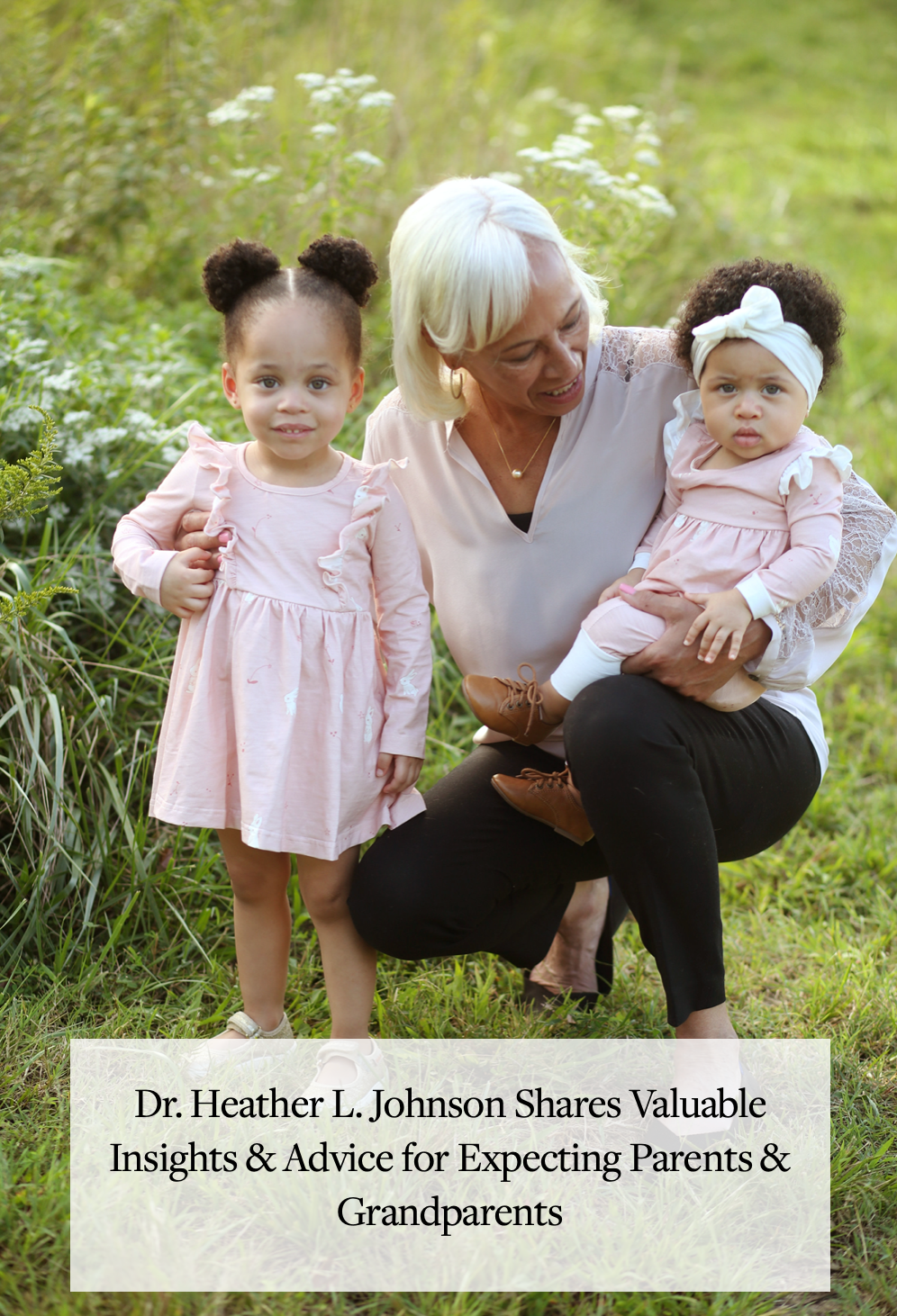
Dr. Heather L. Johnson Shares Valuable Insights & Advice for Expecting Parents & Grandparents

As of the posting of this blog, the data show that COVID-19 infection during pregnancy is still compatible with a good outcome. As always and in general, pregnant women are at more risk when they contract respiratory illnesses. You should therefore redouble your efforts to avoid infection by minimizing yours and your partner’s contacts, wearing a mask and washing your hands frequently. It is important that you continue your prenatal care and doctor’s visits, some of which may be conducted virtually via telemedicine for your protection. Unfortunately, you partner may not be able to be present for your visits, but you can usually arrange for video attendance. There are conflicting data about transmission to newborns, but the general consensus is that breast milk is best for your baby, whether it be pumped or in person. While most hospitals are now allowing partners, and, sometimes doulas, to be present during the birth, it is important to confirm this with your hospital prior to leaving your home as policies and procedures are changing frequently.
Obstetricians typically recommend you stop birth control pills or remove your IUD 2 months before trying to conceive so that the dating of your pregnancy is reliable. If you are young, less than 35, you should seek guidance if you are not pregnant within a year. If you are 35-40, you should seek help after 3-6 months of trying. If you are 40 or over, you should seek assistance immediately. As I am known for saying, “teenagers can stand downwind of sperm and get pregnant. Women over 40, not so much.”
While the science is good, the truth is that most individuals will not benefit from banked blood although their children’s siblings might, and the process is very expensive. If you are either anxious and/or have significant discretionary income, I say, go for it. If not, you should consider investing those funds for the use of purchasing “must have” baby supplies and equipment (e.g., car seat, crib, humidifier)
As excited as you may be about this momentous event, your grandchild is first and foremost the child of your daughter/daughter-in-law, son or son-in-law. This is NOT the time for you to remind them of your experiences as a mother. It is the time to support them in their decisions about THEIR child, your grandchild. Support them in their decisions, no matter how foreign they may seem to be. Be that invisible force that provides them with food, a clean house and naps and support. They have provided you with an amazing gift for you to spoil with your love and affection. Appreciate that and act accordingly and please don’t forget the importance of Covid19 “restrictions” for yours and your grandchild’s health and safety.
Please try to understand the perspective of your first born. Heretofore, he/she has been the center of your universe. Now this smaller/cuter being is commanding the attention you used to give to them. Take time to visit with them, as they have missed you. Then introduce them to “their” baby and allow them liberties such as kissing their feet or some other privilege. Perhaps you can also have a gift for them from the baby? Their feelings are real and impactful. Honor them, please. The introduction of your new baby to his/her older sibling(s) may not happen until you arrive at home depending upon hospital policies due to COVID-19 It is best if you have the baby in the nursery or in a bassinet when your first born comes to see you in the hospital to provide time for you to visit with them before the introducing the baby.
“Good Enough.” The postpartum period is an imperfect time fraught with lack of sleep, realistic and unrealistic expectations, anxiety, worry, fear and frustration. Please, do not aim for perfection. This is neither attainable nor needed. As I tell my patients, “If the health department has not been called, your house is clean enough. If your baby’s crib is not made up exactly as you would have liked, he or she will still sleep just fine.”
All other factors being equal, breastfeeding is the best option for you and your baby. Your milk is generally better tolerated, and antibodies are passed on to the baby. However, if you are not able to make enough milk and/or your baby is not interested in nursing, there are many options (e.g., pumping to bottle feed, using formula to supplement your breastmilk, or using only formula) that will allow adequate nutrition for your baby. You are NOT a failure if you cannot support your baby with breastfeeding alone.
You and your body have been through an incredible stress over the last 9 months, not to mention the upheaval of delivery, vaginal or cesarean. You will need time to recover from these “events.” The first 6 weeks is NOT the time to try to get back into shape. It is the time to recover. Rest, hydration and moderate exercise to make you feel better are what are required during this time. Please be aware that TV personalities and movie stars who quickly get back to their pre-baby weight are not the appropriate role models for those who live in the real world and do not have nannies, personal trainers, chefs and other help.
As a couple, the two of you have decided to invite another being into your life. Sadly, it is easy to forget that you two were a couple before this event, but that is an essential point. This is not the time to keep score and distance yourselves from each other. As a couple, you chose to have a baby. As a couple, you need to search for ways to work forward as a team, not opponents, to raise this amazing person. Be kind to each other. Do not keep score.
Every woman suffers from “baby blues.” How can they not? You have spent 9 months incubating a baby and had your body ripped asunder by delivery and now need to feed this delightful being 24-7. It is natural to be overwhelmed, sad, exhausted and a bit depressed. However, if you find that you are no longer able to feel joy or happiness, or worse, have negative feelings about yourself, your spouse or your baby, you should seek help immediately! You will not be the only one that needs assistance. Many, many others have had difficulty. You are NOT a failure if you are overwhelmed. Your healthcare providers are here for you and understand. Please, do not suffer unnecessarily.
ABOUT
Dr. Heather L. Johnson is a board-certified, actively practicing gynecologist, who, after delivering more than 3,500 babies over 40 years, retired in 2019 as an obstetrician. She is the author of What They Don’t Tell You About Having a Baby: An Obstetrician’s Unofficial Guide to Preconception, Pregnancy and Postpartum Care which was released in October 2019 and is available in both Paperback and eBook on Amazon.com, BarnesandNoble.com, Walmart.com and Goodreads.com. Her second book, What They Don’t Tell You about Menopause: A Gynecologist’s Unofficial Guide to Premenopausal, Perimenopausal and Postmenopausal Life, will be released in the fall of 2020. She has two children and is a proud grandmother of two granddaughters.
She is the senior partner at Reiter, Hill and Johnson, an Advantia practice, with offices in Washington, DC, Chevy Chase, MD and Falls Church, VA. Dr. Johnson attended Yale University School of Medicine and trained at The Walter Reed Army Medical Center in Washington, DC.

Dr. Johnson with her granddaughters
 |
 |

Girls wearing Charming Mary outfits from Little Birdies
To learn more about Dr. Johnson, her books and Dr. J’s Pearls of bite-sized advice, please visit her website AskDrHeatherJohnson.com, and follow her on Instagram (@askdrheatherjohnson), Facebook @askdrheatherjohnson) and Twitter (@askdrjohnson)!
No comments








0 comments